An Immigrant’s Halloween: Blackface, Ghetto Parties, and Disney Princesses
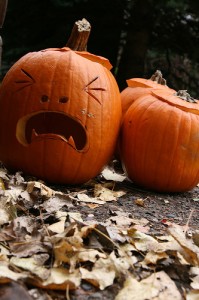 Dear Readers,
Dear Readers,
I have a confession to make. But before I tell you my secret, you have to promise not to laugh at me. Okay? Alright, good. Here it goes:
I’m thirty years old and I’ve never once dressed up for Halloween.
There, I said it. Is that a big deal? Apparently, it is. I had someone go “Aww, you must have had a rough childhood!†and pout at me the other day. I felt so immigrant, in the way I’m sure many immigrants would understand. Kinda like the way you mispronounced words until someone finally corrected you, and you wondered how long you’d been mispronouncing them and why no one had ever said anything. Poor African. Funny accent. How unfortunate. Don’t laugh. Let her keep talking… and no Halloween? Oy. But I digress.
I’m from a place in the world (Nigeria) where black magic isn’t just found in the movies; stories of husbands attempting to poison their wives in order to sacrifice them to some Babalawo that promised riches in return aren’t told around a campfire; they’re relayed with the seriousness of a child kidnapping (which happened often for similar reasons) and a firm warning for everyone to keep praying for protection because you never know what spells, juju, or whatever else someone may be chanting about you.
 Where I come from, Halloween only happened in the classrooms of white/foreign-run primary schools in which little white girls in swinging ponytails dressed up as sparkling fairies, bright-colored caterpillars, wealthy blond princesses, and an occasional culturally appropriated icon — Nefertiti, Cleopatra, a Geisha. Their mothers would sometimes bronze their faces with brown makeup — bought specially for the occasion? —  to make the costume appear more “authenticâ€. I remember wishing that I could be Nefertiti, or Cleopatra… they were beautiful African goddess, but usually portrayed as light-skinned (which both the cute mixed heritage boys and dark-skinned Nigerian boys at my primary school seemed to like).
Where I come from, Halloween only happened in the classrooms of white/foreign-run primary schools in which little white girls in swinging ponytails dressed up as sparkling fairies, bright-colored caterpillars, wealthy blond princesses, and an occasional culturally appropriated icon — Nefertiti, Cleopatra, a Geisha. Their mothers would sometimes bronze their faces with brown makeup — bought specially for the occasion? —  to make the costume appear more “authenticâ€. I remember wishing that I could be Nefertiti, or Cleopatra… they were beautiful African goddess, but usually portrayed as light-skinned (which both the cute mixed heritage boys and dark-skinned Nigerian boys at my primary school seemed to like).
I was one of the darkest skinned girls in my classroom, and though I had really long hair, I knew that I would never be able to get it to fall (or sway) like the swinging ponytail leads that dominated our school plays. I also knew that my parents would never have spent money on shiny gold material and Egyptian arm bracelets for a holiday they believed was just about “white people celebrating witchcraftâ€, so I looked forward to attending school in the United States, where I could fully immerse myself in Halloween, just like in the movies; I’d actually get to see, touch, and carve a real pumpkin, trick or treat without worrying about being kidnapped and sold for parts to juju people, and finally wear a witch costume — complete with a tall hat, green face, and yellow teeth — without teachers accusing me of selling my soul to the devil. I had such simple aspirations.
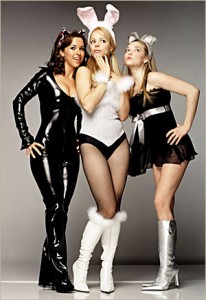 But during my first semester of prep school in the US, the costumes I saw were less childhood coloring book and a little more… R-Rated. My first Halloween weekend was freezing cold. Okay, it was just 60 degrees, but it felt like the Himalayas to me back then. So, there I was wrapped unfashionably and unfestively in heavy fleece layers of brown and black that resembled a moving laundry heap, while my classmates pranced around in adult-sized furry onesies and hormonal teenager garb. I remember the long line that stretched like a Noah’s arc procession of adult fairytale creatures from the the student assembly hall into the common grounds outside.
But during my first semester of prep school in the US, the costumes I saw were less childhood coloring book and a little more… R-Rated. My first Halloween weekend was freezing cold. Okay, it was just 60 degrees, but it felt like the Himalayas to me back then. So, there I was wrapped unfashionably and unfestively in heavy fleece layers of brown and black that resembled a moving laundry heap, while my classmates pranced around in adult-sized furry onesies and hormonal teenager garb. I remember the long line that stretched like a Noah’s arc procession of adult fairytale creatures from the the student assembly hall into the common grounds outside.
I recall the familiarity of the swinging blond ponytails — it seemed they ruled playgrounds even tens of thousands of miles away from my home across the Atlantic. I remember noting, however, that the innocence of their white privilege had re-branded itself post-puberty as intentionally provocative personas — naughty school girls, beauty queens, and virgin cheerleaders. The “pretty girls†of the world who once flit around small classrooms in bright pink Disney princess frocks, now strut down hallways in crimson lipstick and black fingernails, wearing ultra short booty shorts, pleated mini skirts that exposed un-aged butt cheeks, and baby Ts that said things like “Cherry Pop†and “Eat me, I’m Sweetâ€. Needless to say, to an African immigrant who was still trying to make sense of her surroundings, I was pretty sure that my parents would have placed Halloween on their Things That Will Destroy Us with Shame list, right at the top with drugs, prostitution, and MTV’s Spring Break.
So I searched to find space for myself on the flip-side of risque; the kids who fell outside the “cool†crowd — the politically inclined, the art geeks, the emo goths — all seemed to embrace Halloween as an excuse to make bold statements (usually against the dominant vanilla school culture) about who they were. I could have been down with this idea, but the only costume themes I surmised warranted presenting oneself as alien and/or depressed: dead presidents, political revolutionaries, witty takes on vegetables and/or fruit, and apathetic versions of “just myself since I’m always weird and scary anywayâ€. In college, however, costumes did more than make statements, they pushed buttons, and at times, caused so much controversy, the dean needed to send an email to quell the uprising of a student protest.
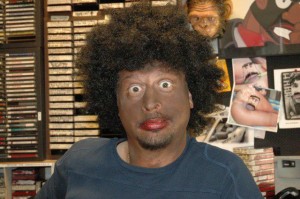 For instance, in my freshman year of college, a group of white (and queer) kids thought it would be funny to throw a “ghetto†party for Halloween, for which people were required to dress up as pimps, hos, drug dealers, and crackheads. Even “gangstuh†rap music was promised (by a white hipster DJ no less — Boston, don’t you dare act surprised).
For instance, in my freshman year of college, a group of white (and queer) kids thought it would be funny to throw a “ghetto†party for Halloween, for which people were required to dress up as pimps, hos, drug dealers, and crackheads. Even “gangstuh†rap music was promised (by a white hipster DJ no less — Boston, don’t you dare act surprised).
That same weekend, a white friend of mine turned heads when he dressed up as Bob Marley, in full on brown body paint. I looked up the meaning of “blackface†after being the only person of color at the party in which he debuted the outfit, and having to smile as white people kept stealing glances at me for a reaction. But that experience doesn’t even compare to the party I attended the following day (80s themed) that included a room full of tall white guys wearing black Afro with pick combs in them, an even more R-Rated version of the swinging ponytails (now barenaked playboy bunnies), and an obnoxious prick that kept following me around all evening, demanding to know what I was supposed to be and drunkenly proclaiming that his Afro was bigger than mine. That experience wasn’t awkward — it was downright infuriating.
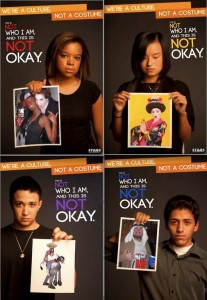 So, I vowed to wash my hands of the political farce that had become Halloween, and avoid the entire fiasco like the plague each year, because quite frankly, I had plenty of opportunities to remain angry at the stupid shit that ignorant white people said to me throughout the year — whether about my accent, my blackness, my African-ness, etc. Â Too much of the other 364 days of the year contained insensitive, xenophobic, culturally appropriating, and downright racist incidents; I deserved at least one day off.
So, I vowed to wash my hands of the political farce that had become Halloween, and avoid the entire fiasco like the plague each year, because quite frankly, I had plenty of opportunities to remain angry at the stupid shit that ignorant white people said to me throughout the year — whether about my accent, my blackness, my African-ness, etc. Â Too much of the other 364 days of the year contained insensitive, xenophobic, culturally appropriating, and downright racist incidents; I deserved at least one day off.
Incidentally, whenever I did entertain the idea of venturing out on Halloween weekend, I would fantasize about being reverse-offensive, culturally subversive, and extremely political — the angry fucking black woman that showed up with a blond wig and all white body paint talking in a valley girl accent, chewing gum with my mouth open, and humping the bar stool for attention (cause that’s how offensive it becomes when Halloween costumes insult entire cultures). One year, I actually thought of a black T-shirt for myself that said, “All the Bob Marley Costumes Were Taken by White People.†But plotting my reverse-offensiveness tactics for Halloween weekend didn’t make dealing with it any easier — it just kept making me angry. And who wants to spend a weekend that is supposed to be fun, angry? I don’t know what’s gotten into me this year (oh right, I just turned thirty), but I find myself yearning for the experiences I almost had in my youth.
For the first time in my life, for Halloween, I want to dress up, go trick or treating, and pose with a wicked pumpkin. I want to buy a sword and defend my woman’s honor like the dashing prince I always pretended to be when I was a kid and my siblings were asleep; I’d beg my girl to dress up as Xena Warrior princess so she can continually reject my grandiose displays of machismo, but make out with me in the car train when no one is looking.
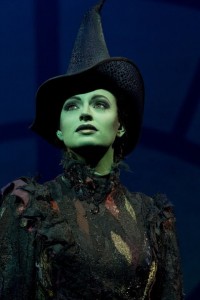 I want to be Elphaba from Wicked, and represent the experience of every black girl that was called ugly by their white school teachers, who felt green with envy over the fact that they weren’t pretty white princesses with glittered wings and minions, yet who discovered their inner magic, their inner will to defy gravity and lead uprisings that made the world better, and less vanilla. And goddamnit, I want to be Storm. Yes, Storm. I know ti’s cliche — a black girl wanting to be Storm, but I don’t care. Storm was the one African superhero I had as a child. I woke up every Saturday to watch her kick ass in the X-men cartoon series. I still pretend Angela Basset played her (and that Halle Berry didn’t completely destroy my favorite afrofeminist heroine with her weak ass performance — ugh, I can’t even talk about it). I should be able to want to be a black female character on Halloween without worrying that I’m being ‘typical’, because goddamnit, Storm kicks ass!
I want to be Elphaba from Wicked, and represent the experience of every black girl that was called ugly by their white school teachers, who felt green with envy over the fact that they weren’t pretty white princesses with glittered wings and minions, yet who discovered their inner magic, their inner will to defy gravity and lead uprisings that made the world better, and less vanilla. And goddamnit, I want to be Storm. Yes, Storm. I know ti’s cliche — a black girl wanting to be Storm, but I don’t care. Storm was the one African superhero I had as a child. I woke up every Saturday to watch her kick ass in the X-men cartoon series. I still pretend Angela Basset played her (and that Halle Berry didn’t completely destroy my favorite afrofeminist heroine with her weak ass performance — ugh, I can’t even talk about it). I should be able to want to be a black female character on Halloween without worrying that I’m being ‘typical’, because goddamnit, Storm kicks ass!
But now what? After thirty years of getting no practice being creative for Halloween, I am stumped for ideas for a costume. Moreover, I’m no longer limited to the middle class earnings of my parents, but to the emptiness of my do-gooder wallet; purchasing a costume isn’t an option. And even if it were, there’s no way I could pull off a costume a la carte e.g. the latest, Nathalie Portman’s Black Swan, the classic Marilyn Monroe, or sexy swinging ponytail school girl. And yes, yes, I know Disney finally gave us poor little black girls a princess (and a racially ambiguous frog, I mean prince), but I’m not twelve anymore so I’m not sure that’s going to work for me.
Am I the only person of color and/or immigrant in this predicament? I’m still doing some research, but in the meantime, I’d really like to know: What costume choices are available to people of color on Halloween (besides Barack and Michelle Obama)?
[box type=”shadow”]Is race still a hot button issue during Halloween? Or is everyone just being way too sensitive? I’d love to hear what you think. Meanwhile, I am thinking about compiling a list of Top 10 Halloween Costume Ideas for POC, so please comment with your suggestions, both for the post, and for me, ‘cause this immigrant African girl is on a mission to get some candy this year.
[/box]
